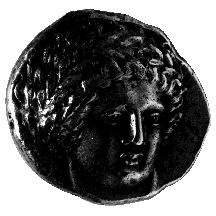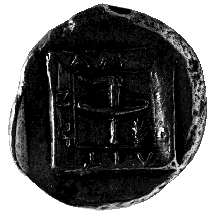



(25) Amphipolis, Macedon (Greece) - AR tetradrachm, 356-355 B.C.,
14.34 g. (inv. 93.008).
Obverse: Three-quarter facing head of Apollo wearing laurel wreath.
Reverse: Race torch in square, border inscribed![]() : of the Amphipolitans.
: of the Amphipolitans.
Provenance: Harlan Berk, 1990.
Bibliography: C.M. Kraay, Archaic and Classical Greek Coins (Berkeley
and Los Angeles 1976) 151-152.
Amphipolis, a strategic city on the river Strymon in the Chalkidike, was
important for its access to the gold and silver mines and timber of Mt.
Pangaion. The city was founded by Athens in 437 B.C. and did not issue coins
while it was under Athenian control. In the Peloponnesian War, however,
the Spartan general Brasidas took the city from Athens and from shortly
afterward until the city was taken by Philip of Macedon in 357 B.C. it issued
its own coins, of which the most well known are its beautiful tetradrachms.
The obverse depicts the nearly facing head of Apollo, undoubtedly inspired
by the facing heads of Kimon on Syracusan coins of the period (see no. 17).
The Amphipolitan head, however, with its very full face and extremely thick
hair, differs significantly from the Syracusan versions and was probably
the work of local die-cutters. The race-torch on the reverse refers to the
local cult of Artemis Tauropolis or Brauronia, in whose honor torch races,
the Lampadephoria, were held.
C.L.L.



All contents copyright (c) 1996.
Lawrence University
All rights reserved.